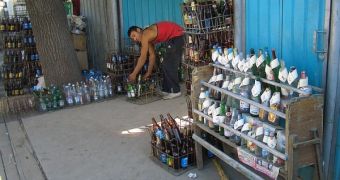The reuse part of the reduce-reuse-recycle “trinity” is the most important of all, because it sets the bases for reducing the amount of chemicals you consume on a daily basis, in terms of plastic packages, gasoline and the likes, and also downsizes the importance of recycling, which usually involves the use of fossil fuels for transporting materials to processing centers, and which can also result in lower-quality products.
But reusing is the step that has most potential in the future, and the simplest of all, at that. Basically, what you have to do is minimize the amount of plastic you consume regularly, which is not as difficult to do as it sounds.
First of all, consider bringing your own bags at the supermarket, instead of buying new bags all the time. This helps you remain empowered, while at the same time putting a major dent in the profits of plastic companies, which will sooner or later be forced to go out of business, if sufficient numbers of people do this. On average, an American spends $12 per day on coffee cups, lids, straws and other such commodities. By having your own reusables, you can also save money, in addition to protecting the environment.
Another thing to do is shopping at home, a concept that does not involve online shopping, but simply looking around the house before buying small items, such as photo frames, duck tapes and anything in between. By knowing everything you have, and exactly what you need, you also reduce “impulse” shopping, which most of the time results in buying unnecessary items that will only fill your closet, without any practical application.
Lending and swapping items with friends is a great way of reducing expenses and minimizing the number of things you would regularly buy. Swap and lends usually involve CDs, DVDs, books, toys or even clothes. Aside from everyone saving money, these are great times to be with the people you love, and maybe even throw a party.
These things may not seem like much, but in the long run you'll realize that the savings you've made went by unnoticed, though you didn't leave as much money in the supermarket as before. As an additional step, when you no longer need a plastic, glass or metal item, you can send it to recycle points, where it will be taken care of.

 14 DAY TRIAL //
14 DAY TRIAL //